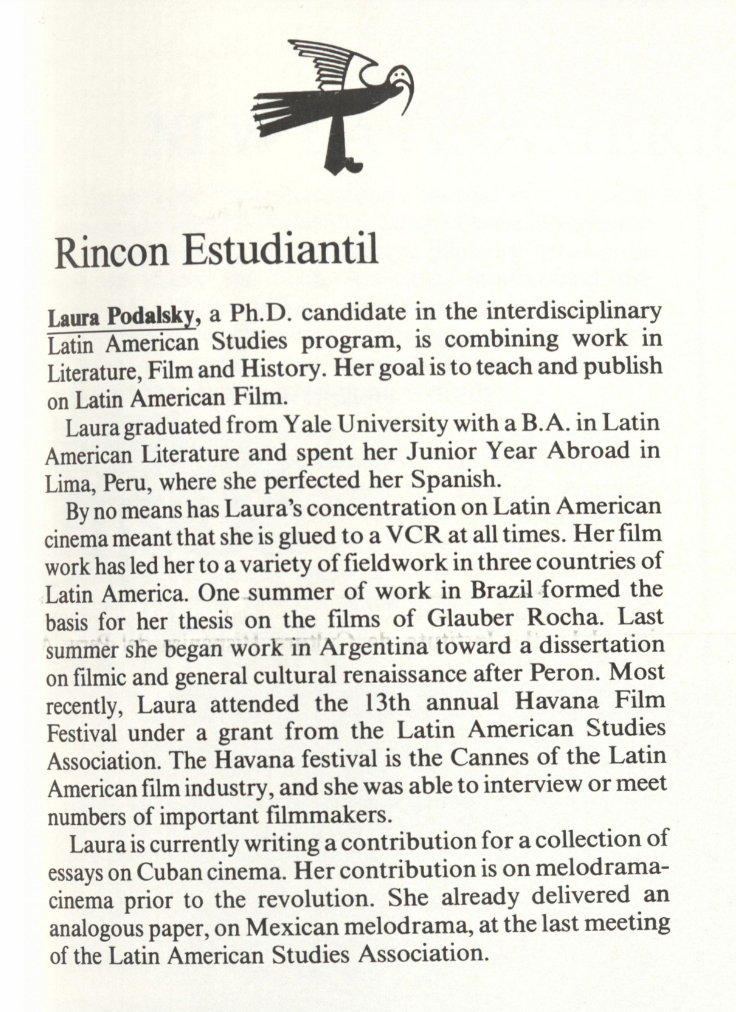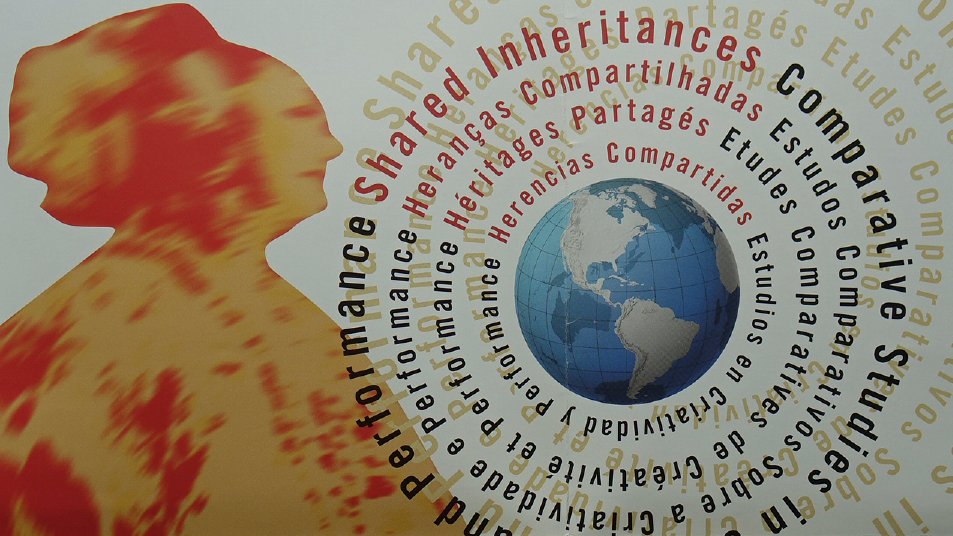
The study of culture played a fundamental role in the shaping of a program of Latin American Studies since the 1940s. The question was: what field did culture fall into? Anthropology, the historical sciences, and the arts and humanities all had reasonable claims to this subject matter. Interdisciplinarity held the answer to that question. As early as 1972, the Center for Latin American Studies’ undergraduate curriculum required students to take a two-part Cultural Heritage of Latin America sequence, split chronologically from Discovery to Independence and then to present day, as a basis for the study of ideas, aesthetic trends, and popular traditions of Latin America.
At the same time, much of the early relationship between Tulane and Latin America consisted of bringing Latin American musicians, artists, and writers to share their creations. While these events were, in part, related to cultural diplomacy, this engagement eventually paved the way for the formation of an entire academic field that studied the culture of Latin America.
In October 2022, we brought together three key figures of the rising presence of Latin American Cultural Studies at Tulane in the last decades of the 20th century. Below is the full conversation between Ana M. López, Daniel Balderston, and Laura Podalsky. What follows is a multimedia story about this uptake of culture.
By the 1980s, the realm of Area Studies began to see major expansion in terms of objects of study, often drawing from interdisciplinary approaches that did not respect traditional disciplinary boundaries. This shift in the field echoed the emergence of Cultural Studies in the UK in the 1970s. In 1980, the Center received a Mellon grant for “The Creative Continent: Society and Culture in Latin America” to fund interdisciplinary courses, lectures, summer seminars, and fellowships that revolved around topics like nationalism, education, religion, Afro-Latin America, and Indigenous cultures. Part of the goal was to bridge the gap between the humanities and social sciences.
Key faculty hires in the Departments of Spanish and Portuguese and Communication solidified the expansion of cultural study with Daniel Balderston joining the faculty in 1983 and Ana M. López’s arrival in Fall 1985. Tulane and Loyola co-hosted the Meeting of the Society for Latin American Popular Culture in April 1986.1
A Dynamic Duo: López-Balderston
This shift toward the cultural found two leading forces in López and Balderston who throughout the 1980s and 90s produced a fruitful set of multi-form collaborations.
“I think that we hit it off right away because we were both interested in growing the field of thinking about Latin American culture and intellectual history, and what subsequently became cultural studies.”
– Dan Balderston
In terms of pedagogy, the pair co-taught a graduate seminar, LAS 795: “Revolutions and Dreams: Latin American Culture in the 1960s,” in Spring 1993.2 The course combined study of “literature (Cortazar’s Hopscotch, Puig’s Betrayed by Rita Hayworth, Poniatowska’s Massacre in Mexico, etc.), film (Tomás Gutiérrez Alea, Glauber Rocha, Miguel Littin, etc.) and popular culture (Quino’s Mafalda comic strips, Rius, the Cuban and Chilean new song movements).”
Balderston, López, and Amy Koritz jointly proposed a minor in Cultural Studies that was approved by Tulane’s Curriculum Committee in 1995. The minor offered undergraduate students interdisciplinary courses with the option of two concentrations: Performances of Culture or Natures, Technologies, Cultures.3
The two also collaborated to launch South: Cultural Studies in the Americas, a very early electronic journal of Latin American Cultural Studies, and co-edited the Encyclopedia of Contemporary Latin American and Caribbean Cultures (2000), both of which were landmarks in the field. South was born out of a November 1993 conference on Cuban culture; the first issue on Greater Cuba was published in Summer 1995.4 The second issue, entirely in Spanish, on Patagonia, launched in Fall 1997.
The three-volume Encyclopedia with more than 4000 entries and over 400 contributors pushed the boundaries of Latin American studies and the definition of culture itself. Its atypical entries included a wide variety of topics such as corn and corncakes, fina estampa, brain drain, and Walter Mercado. It likewise anticipated many of the trends that came later in cultural studies, including the side-by-side study of Latin America and the Caribbean, food studies, and even star studies.
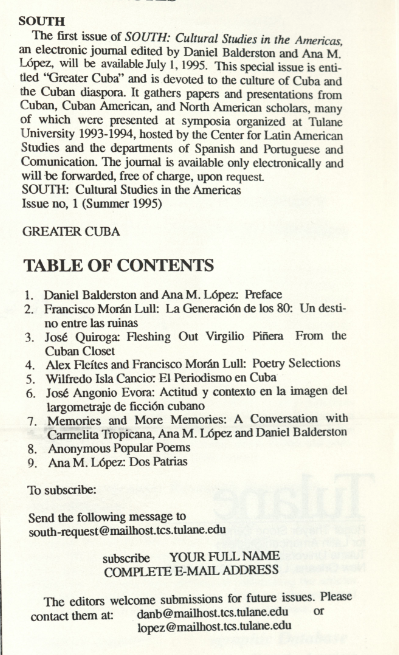
“Cultures are complex interrelationships, cultural practice is diverse and creative. In some way, what is involved here is an attempt to make sense of the world, or to reshape. That activity is not restricted to the grand, self-conscious interventions in the world; a popular tune or a national dish may tell as complex a story as a literary work. Our starting point has been that all these diverse manifestations have value and significance – and that they deserve to coexist in the book as they do in the world.”
– Balderston, Gonzalez, & López, “How to Use this Encyclopedia,” Encyclopedia of Contemporary Latin American & Caribbean Cultures, xxiii-xxiv
Beyond teaching and research, López and Balderston were also responsible for mentoring many key figures of the next generation of scholars in the field Latin American film and cultural studies. Their first such collaboration was Laura Podalsky (PhD, Latin American Studies, 1995) whose research spans across Argentine cultural studies, Latin American film studies, and urban studies.
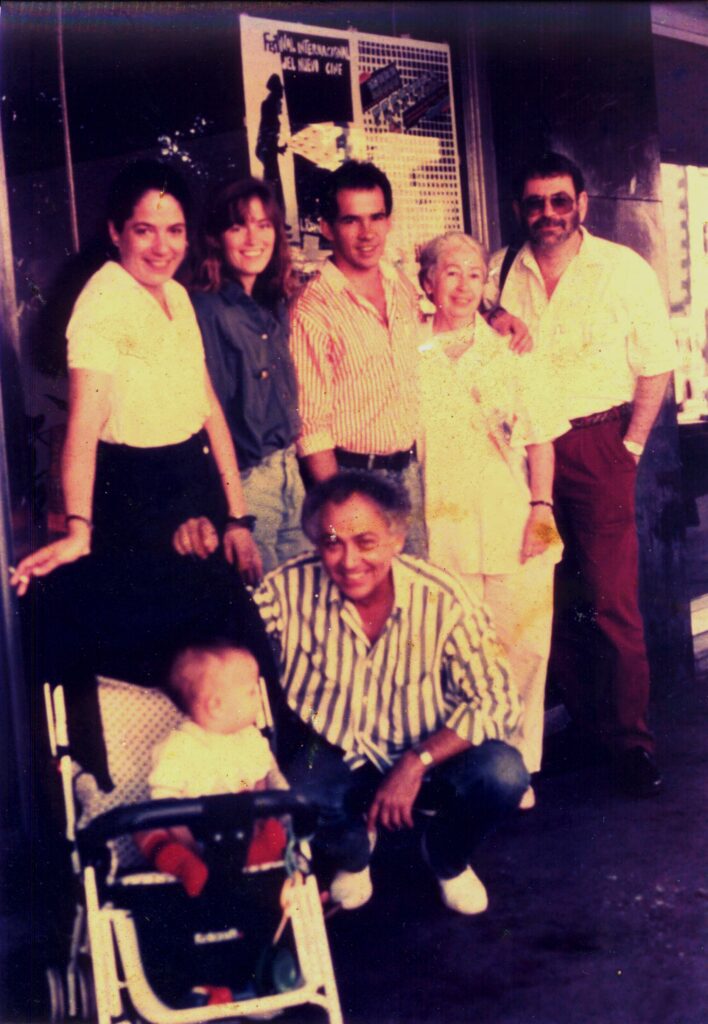
While López and Balderston had many overlapping interests, each forged a field-defining path within distinct areas of cultural studies.
Gender, Sexuality and Popular Culture
While the 1990s witnessed a flurry of scholarship in gender and sexuality studies, work that dialogued with the Latin American context was scant. In 1997, Balderston co-edited Sex and Sexuality in Latin America: An Interdisciplinary Reader with Donna Guy. This volume was fundamental in mapping the field of sexuality studies in Latin America with an interdisciplinary approach that included music studies, history, anthropology, literature, and performance studies.
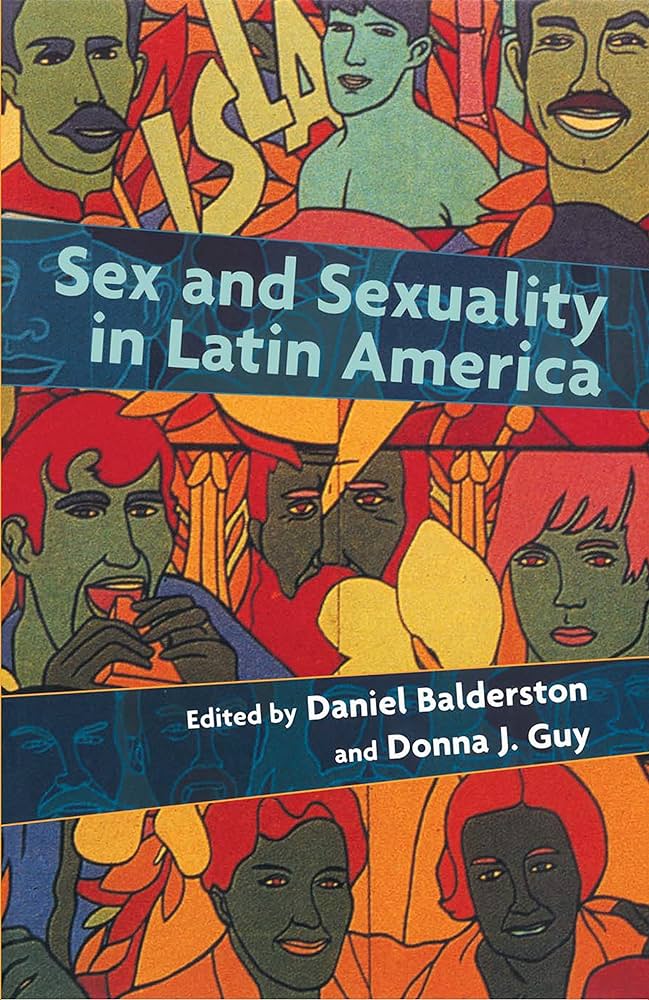
Latin American Cinema and Media Studies
“Hers is an approach that looks to cinema not only for its narratives but for the relations it makes possible. Cinema makes room for play between texts, between histories, between regions, between genres, between identities, between media, and between people. Perhaps it isn’t cinema but rather Ana who enables such relations to take place”
– Nilo Couret, “Siete veces Ana: An Afterword”, in Ana M. López Essays, 477
Ana López’s prolific and wide-ranging academic production solidified her as a foundational member of the field of Latin American Film Studies. With Laura Podalsky and Marvin D’Lugo, she co-edited The Routledge Companion to Latin American Cinema (2017), a state-of-the-field collection. López’s scholarship was unified for the first time in the volume Ana M. López Essays (2023), co-edited by former students Laura Podalsky and Dolores Tierney. This work, originally published between 1988 and 2017, treats a variety of subjects, from cinema and modernity in early Latin American cinema, to women in Mexican cinema, to telenovelas, to documentary, to Cuban filmmakers. The volume’s launch at the Stone Center in May 2023 celebrated López’s indelible mark on the field.
López organized a plethora of film series and screenings, conferences, and symposia, creating spaces for viewing, discussing, and creating community around Latin American film and media. In just her second semester at Tulane (Spring 1986), López organized her first film series, Classic Latin American Cinema. Other landmark events include the Nobody’s Women Film Series in 1994 that highlighted Mexican’s forgotten women filmmakers. Two years later in October 1996, López directed and programmed the Fifth Latin American Popular Culture Conference: Popular Cinemas, which featured Carlos Monsiváis as keynote speaker.
In Fall 1999, López commemorated 40 years of the Cuban Film Institute (ICAIC) with a retrospective of Cuban films and a visit by Julio García Espinosa, filmmaker and founder of ICAIC. Returning to her focus on Latin American women filmmakers, López co-directed a film series and conference with Rebecca Atencio (Spanish and Portuguese), “Mulheres da Retomada: Women Filmmakers in Contemporary Brazilian Cinema,” in 2010.
Below are a selection of posters and programs that illustrate the breadth of Latin American cinema covered by López’s programming.
The 2000s
The turn of the century and the arrival of Tom Reese as the new Executive Director of the Stone Center contributed to the fertile terrain in the growth of cultural studies. The new millennium brought a widened focus on music and popular culture that was likewise supported by a series of new faculty hires intended to fortify ethnomusicology, art history, African Diaspora Studies, and communication around the overarching theme of art and politics.
Christopher Dunn (Spanish and Portuguese), hired in 1996, co-edited the volume Brazilian Popular Music and Globalization (2001), and later the monograph, Contracultura: Alternative Arts and Social Transformation in Authoritarian Brazil (2016). Idelber Avelar (Spanish and Portuguese), arrived at Tulane in 1999 with research focused on the Southern Cone and publications including The Untimely Present: Postdictatorial Latin American Fiction and the Task of Mourning (1999) and Brazilian Popular Music and Citizenship (2012), which he co-edited with Dunn.
The scholarship of Marilyn Miller (Spanish and Portuguese), a faculty hire in 2001, engages with race and popular culture, largely visual culture and music. Rise and Fall of the Cosmic Race: The Cult of Mestizaje in Latin America (2004) treats a variety of cultural objects and practices, and Miller later edited Tango Lessons: Movement, Sound, Image, and Text in Contemporary Practice (2014). Antonio Gómez (Spanish and Portuguese, 2007- ) merges literature and documentary with studies of exile and memory, largely in Argentina and Cuba. He is the author of Escribir el espacio ausente. Exilio y cultura nacional en Díaz, Wajsman y Bolaño (2013) and recently co-edited The Film Archipelago: Islands in Latin American Cinema (2021).
Daniel Sharp (Music) joined Tulane’s faculty in 2008. As an ethnomusicologist, his research focuses on the cultural studies of popular music in Northeast Brazil, published as Between Nostalgia and Apocalypse: Popular Music and the Staging of Brazil (2014).
Cultural studies shaped the intellectual life of Tulane. In 2003, LAGO (Latin American Graduate Organization) presented a seminar series with an interdisciplinary roundtable on “Race and Pop Culture,” with Pamela Franco (Art History), Justin Wolfe (History), Idelber Avelar (Spanish and Portuguese), and Susannah Glusker from the Universidad Iberoamericana.
Ana López and Marilyn Miller co-organized “Caribbean Soundscapes: A Conference on Caribbean Musics and Culture” in 2004, an event co-sponsored by the Cuban and Caribbean Studies Institute. The event culminated with performances by Jorge Moreno, Locos por Juana, and Almas Gemelas at TWIROPA in the warehouse district.
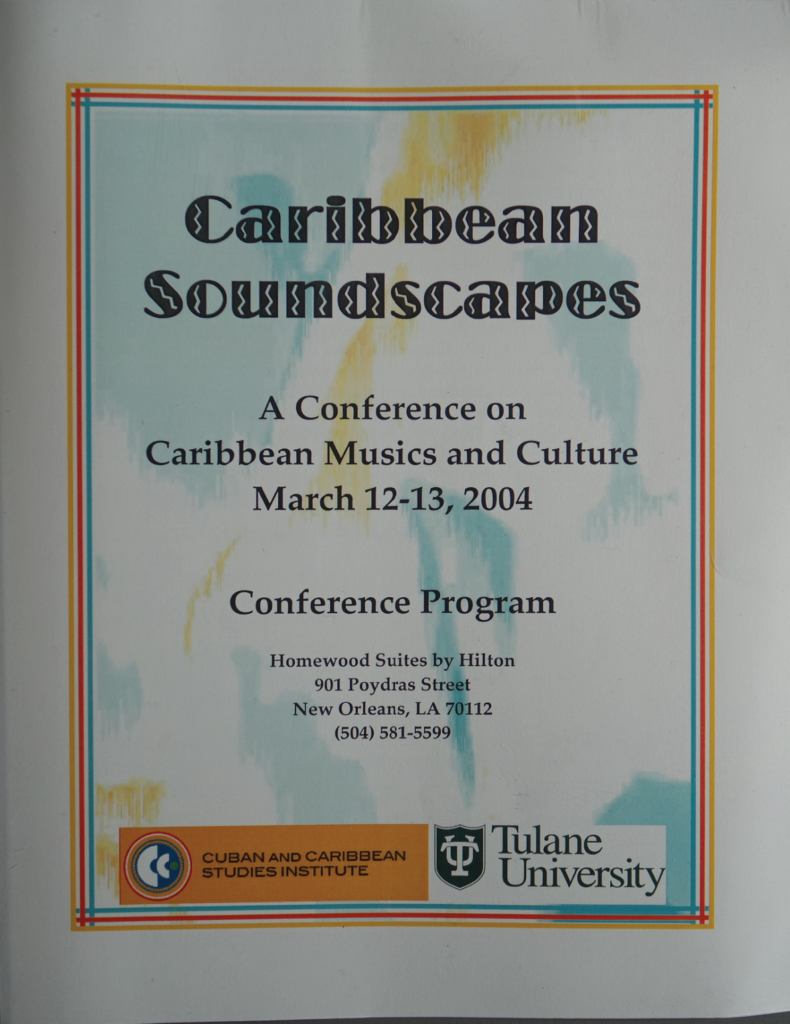
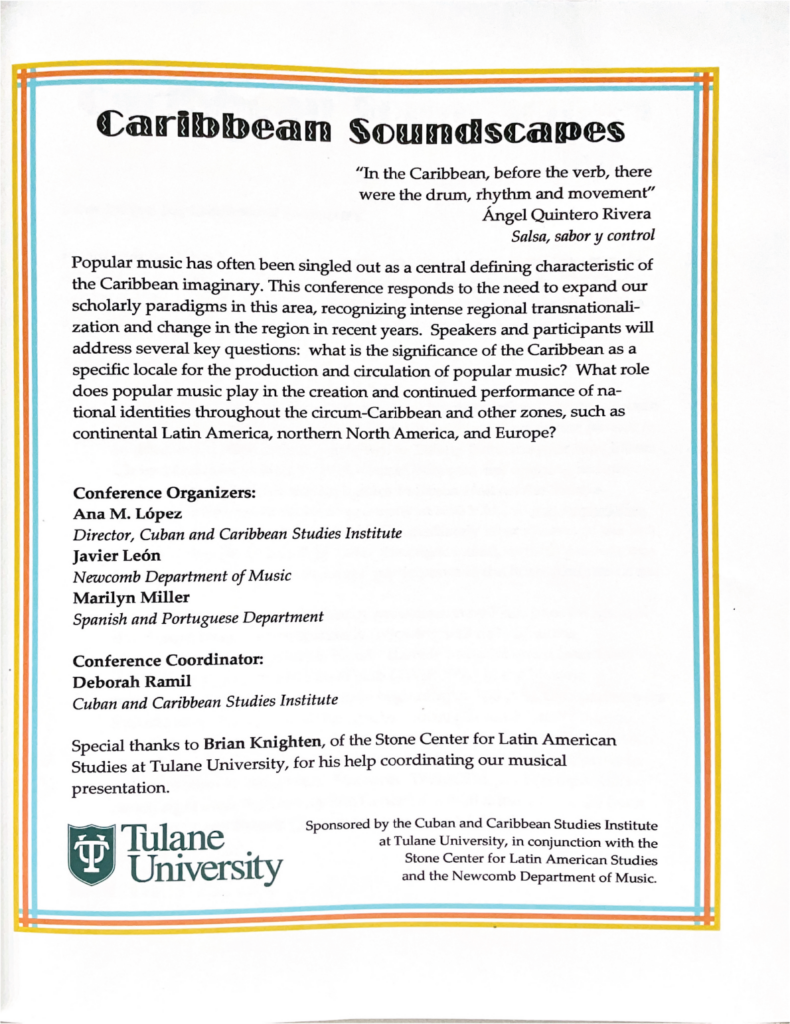
From 2003-2006, the Stone Center and the Deep South Regional Humanities Center co-hosted a fellowship program, “Shared Inheritances: Comparative Studies in Creativity and Performance,” funded by the Rockefeller Foundation. Fellows would “study cultural practices and institutions throughout the Mississippi-Gulf-Caribbean region” with the intent of creating workshops and symposia. This focus on hybrid expressive cultures—festivals, carnivals, religion, games, the roots of jazz, and the rituals of everyday life—reflects a clear Cultural Studies approach and an ongoing scholarly project to trace connections between New Orleans and Circum-Caribbean contexts.
Cultural Studies Futures
In the centennial of Tulane’s relationship with Latin America, the field of cultural studies is still dynamic. In 2023, Zorimar Rivera Montes joined Tulane as Assistant Professor of Latinx Literatures and Cultures, a new line with a joint appointment in the Departments of English and Spanish and Portuguese. Her research, centered on Puerto Rican and Caribbean Latinx cultural literatures and popular cultures, builds a bridge between Tulane’s strong tradition in Latin American studies with the rising field of Latinx Studies.
Listen to Program alumna Christina L. Sisk (PhD, 2004, Spanish & Portuguese), currently Associate Professor of Hispanic Studies at the University of Houston, reflect on the importance of interfacing US Latinx Studies with traditional Latin American Studies:
This new hire demonstrates the robust nature of cultural studies at Tulane, expanding its coverage to include Latinx popular cultures and continuing to grow in fields like Performance Studies, Sound Studies, and no doubt other areas that will evolve in the future.
Text and Images: Olivia Cosentino & Alejandro Kelly-Hopfenblatt
Zemurray-Stone Postdoctoral Fellows
April 2024

